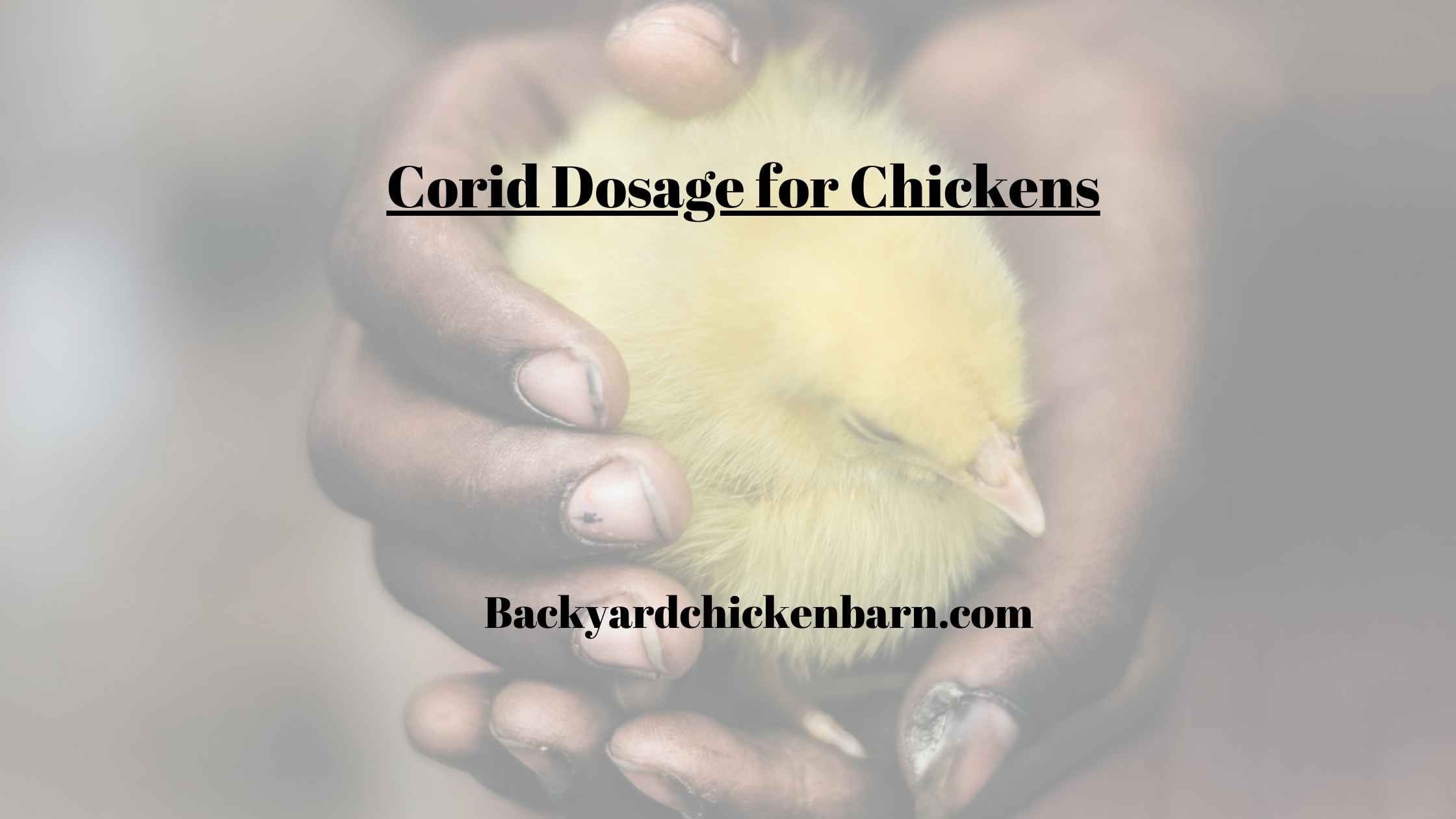Corid Dosage for Chickens – Dosage Chart, Effects, Administration etc.
Corid (amprolium) is a popular medication used in poultry to treat coccidiosis, a parasitic disease that affects the intestinal tracts of chickens and other birds.
If you suspect your chickens have coccidiosis, it’s crucial to get an accurate diagnosis and ensure you administer the correct dosage for effective treatment. Here’s a guide on Corid dosage for chickens:
1. Forms of Corid:
Corid comes in two main forms:
- Liquid (9.6% solution)
- Powder (20% soluble powder)
2. How Much Corid for Chickens? corid dose for chickens Instructions:
For Liquid Corid (9.6% solution):
- Severe Outbreaks: Mix 10 ml (about 2 teaspoons) per gallon of water for 5 consecutive days.
- Moderate Outbreaks (or as prevention): Mix 5 ml (about 1 teaspoon) per gallon of water for 5 consecutive days.
how much corid 9.6 for chickens
- Treatment:
Dosage: 2 teaspoons (10 ml) of Corid 9.6% Liquid per 1 gallon of water.
Duration: Administer daily as the sole source of drinking water for 5 consecutive days.
- Prevention:
Dosage: 1/2 teaspoon (2.5 ml) of Corid 9.6% Liquid per 1 gallon of water.
Duration: Administer daily as the sole source of drinking water for 21 consecutive days.
For Powdered Corid (20% soluble powder):
- Severe Outbreaks: Mix 1/2 teaspoon per gallon of water for 5 consecutive days.
- Moderate Outbreaks (or as prevention): Mix 1/4 teaspoon per gallon of water for 5 consecutive days.

Corid Dosage Chart for Chickens
| Formulation | Purpose | Dosage | Duration | Water Supply |
|---|---|---|---|---|
| Corid Liquid (9.6% Amprolium solution) | ||||
| Treatment | 2 teaspoons (10 ml) | 5 consecutive days | Sole source of water | |
| Prevention | 1/2 teaspoon (2.5 ml) | 21 consecutive days | Sole source of water | |
| Corid Powder (20% Amprolium powder) | ||||
| Treatment | 1/2 teaspoon | 5 consecutive days | Sole source of water | |
| Prevention | 1/6 teaspoon | 21 consecutive days | Sole source of water |
3. Administration:
- Replace Regular Water: During the treatment, replace your chickens’ regular drinking water with the Corid solution.
- Duration: Administer the Corid-treated water for 5 consecutive days. Ensure that the birds consume the entire medicated water daily before you refill it.
- Freshness: Prepare a fresh solution daily to ensure its effectiveness.
4. Precautions:
- Other Medications: Do not give Corid with other medications unless approved by a veterinarian.
- Vitamin Supplements: Avoid providing vitamin supplements, especially those with Vitamin B1 (thiamine), as Corid works by blocking thiamine uptake in coccidia parasites.
- Monitor Birds: Watch for any signs of distress or adverse reactions in your chickens. If you notice any issues, contact a veterinarian immediately.
5. Post-Treatment:
- Probiotics: After finishing the Corid treatment, consider offering your chickens probiotics to help restore beneficial gut bacteria.
- Clean and Disinfect: To prevent a recurrence, thoroughly clean and disinfect the coop, feeders, waterers, and other equipment. Coccidia oocysts can survive in the environment for a long time.
6. Notes:
- Consultation: Always consult with a veterinarian before starting any medication, including Corid.
- Label Instructions: Always follow label instructions or veterinarian guidance when determining dosage.
- Store Properly: Keep Corid in a cool, dry place, away from direct sunlight and out of reach of children.
ALSO SEE: LA-200 (Oxytetracycline) for Chickens
Conclusion:
Corid can be a life-saving treatment for chickens afflicted with coccidiosis. By administering the correct dosage and following the proper protocol, you can help ensure your flock’s health and well-being. Always remember to consult a veterinarian for guidance tailored to your specific situation.
FAQ: Corid Dosage for Chickens
1. What is Corid used for in chickens?
Answer: Corid (amprolium) is used to treat and prevent coccidiosis, a parasitic disease affecting the intestines of chickens.
2. How is Corid administered to chickens?
Answer: Corid is mixed with drinking water and provided to the chickens.
3. How long should I treat my chickens with Corid?
Answer: Typically, treatment lasts for 5 consecutive days.
4. Can I give my chickens other medications while they are on Corid?
Answer: You should avoid giving other medications concurrently with Corid unless approved by a veterinarian.
5. Why should I avoid giving vitamin supplements with Corid?
Answer: Corid works by blocking thiamine uptake in coccidia parasites. Supplementing with Vitamin B1 (thiamine) can interfere with its effectiveness.
6. Is Corid safe for all ages of chickens?
Answer: Yes, Corid is safe for both chicks and adult chickens. Always follow the recommended dosage.
7. What are the signs of coccidiosis in chickens?
Answer: Symptoms include lethargy, diarrhea (sometimes bloody), reduced appetite, and ruffled feathers.
8. How often should I prepare a fresh Corid solution?
Answer: A fresh solution should be prepared daily.
9. What should I do after the 5-day Corid treatment?
Answer: Consider offering probiotics to your chickens to restore beneficial gut bacteria. Also, thoroughly clean and disinfect their environment.
10. Can I eat eggs from chickens treated with Corid?
Answer: It’s recommended to discard eggs from chickens under treatment and for a short period after. Consult the product label or a veterinarian for specific withdrawal times.
11. Can coccidiosis be prevented without medication?
Answer: Good sanitation practices reduce the risk, but during outbreaks or in high-risk situations, medication may be necessary.
12. Can I overdose my chickens on Corid?
Answer: While Corid is generally safe, always use the recommended dosage to avoid potential issues.
13. Where should I store Corid?
Answer: Corid should be stored in a cool, dry place, away from direct sunlight.
14. Can I use Corid on other poultry besides chickens?
Answer: Yes, Corid can also be used for turkeys and other poultry. Always consult the label or a veterinarian.
15. Does Corid have any side effects in chickens?
Answer: When used as directed, side effects are rare. If you notice any adverse reactions, contact a veterinarian.
16. How does Corid work against coccidiosis?
Answer: Corid works by inhibiting thiamine uptake in coccidia parasites, which disrupts their life cycle.
17. How can I ensure my chickens drink the medicated water?
Answer: Replace all other water sources with the medicated water and ensure it’s their only source of hydration.
18. Can I mix Corid with food instead of water?
Answer: It’s recommended to mix Corid with water. If you have concerns, consult a veterinarian.
19. How can I prevent coccidiosis in the future?
Answer: Maintain a clean and dry environment, avoid overcrowding, and rotate pastures if free-ranging.
20. Do all chickens need treatment if one shows symptoms?
Answer: In a flock, if one chicken shows symptoms, others may also be at risk. It’s often advised to treat the entire flock.
21. Can I use Corid as a preventive measure?
Answer: Yes, Corid can be used preventively, especially in high-risk situations.
22. Is coccidiosis contagious to humans?
Answer: No, coccidiosis in chickens is not contagious to humans.
23. How can I tell if the treatment is working?
Answer: Improvement in symptoms and overall health of the chickens are indicators.
24. Are there alternative treatments to Corid?
Answer: Yes, there are other coccidiostats available. Consult a veterinarian for options.
25. Can I use expired Corid?
Answer: It’s best not to use expired medications as their efficacy may be reduced.
26. How often should I clean the coop during and after treatment?
Answer: Clean the coop thoroughly before starting treatment and maintain cleanliness throughout. A deep clean is advised post-treatment.
27. How long does it take to see improvement in my chickens?
Answer: You should start noticing improvement within a few days of treatment.
28. Can coccidiosis become resistant to Corid?
Answer: Resistance can develop with any medication if not used properly. Always follow recommended dosages and treatment durations.
29. Can I vaccinate my chickens against coccidiosis?
Answer: Yes, vaccines are available for coccidiosis prevention.
30. Is it normal for the feces to change color during treatment?
Answer: Some changes in feces might be noticed due to the medication and the disease’s effect on the digestive system.
31. How often should I use Corid as a preventive measure?
Answer: Regular preventive use is not typically recommended unless you have recurrent outbreaks. Consult a veterinarian for guidance.
32. Can I use Corid for ducks or quails?
Answer: While Corid is primarily labeled for chickens and turkeys, it’s crucial to consult a veterinarian for usage in other birds.
33. Should I isolate sick birds during treatment?
Answer: It’s a good practice to isolate sick birds to reduce stress and prevent further spread.
34. Can Corid harm my chickens’ kidneys or liver?
Answer: When used as directed, Corid is safe. Always adhere to the recommended dosage.
35. How soon can chicks be treated with Corid?
Answer: Chicks can be treated if they show signs of coccidiosis. Always follow the recommended dosage for their age and size.
36. Can I mix Corid with other vitamins or supplements?
Answer: It’s best to avoid mixing Corid with other supplements, especially those containing thiamine.
37. How do I dispose of leftover Corid solution?
Answer: Discard any unused solution as per local regulations.
38. Are there any natural alternatives to Corid?
Answer: Some poultry keepers use natural remedies like oregano oil or apple cider vinegar, but their efficacy isn’t scientifically proven like Corid.
39. Can Corid be used in laying hens?
Answer: Yes, but it’s essential to adhere to egg withdrawal periods, as specified on the label or by a vet.
40. If I miss a day of treatment, should I start over?
Answer: If a day is missed, continue with the treatment but ensure the full 5-day course is completed. If unsure, consult a vet.


